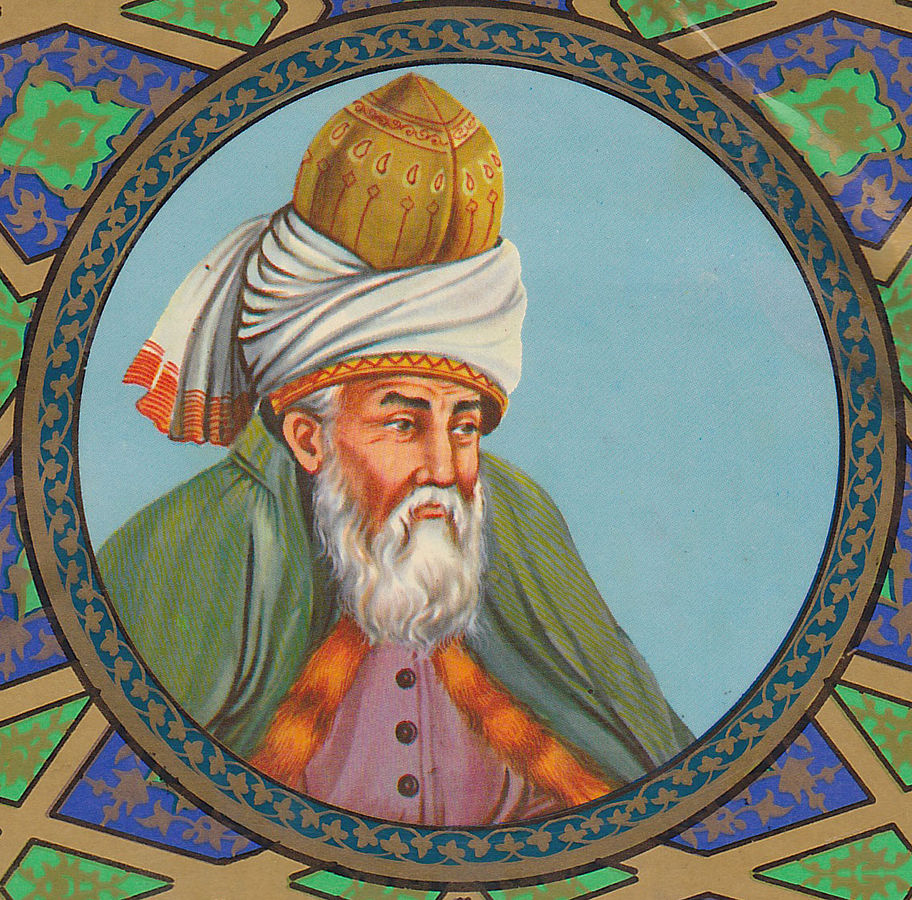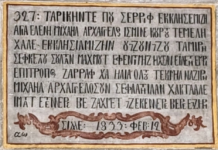In this month’s ‘Famous Turk’ article, we’re looking at Mevlana – known more popularly in the English-speaking world as ‘Rumi’ – the Anatolian philosopher and the father of the Mevlevi sect. But before we begin, let’s debunk a popular myth. “Mevlana”, real name Jalal ad-din Muhammad Balkhi, born to a family of scholars in Balkh, modern-day Afghanistan, or Wakhsh, modern-day Tajikistan – or Khorosan, modern-day Iran – was not a Turk. Claims to his exact origins are disputed like Baklava, however, he was most likely a Persian who settled in the Western-most area of the Seljuk Empire in the early 13th century – Konya, to be precise.

So why is “Mevlana”, (a title meaning “Spiritual Master”), this month’s Famous Turk? Well, for two reasons: Firstly, origins to one side, the mystic spent many years of his life writing his most influential works in Konya, and the city, as well as the Ministry of Tourism, holds him in the highest regard. Secondly, and more importantly, the Mevlana has a cult following in Turkey unrivalled by any other religious personage after the Prophet. Furthermore, he succeeds in bridging class, religion, gender, nationality and every other major social divide in the country.
This makes him a truly unique figure, and one who has inspired many subsequent generations of writers, artists and theologians alike. Nothing attests to Mevlana’s universal qualities better than the poet’s own, oft-quoted words, addressing an audience that excludes none:
“Come, come again, whoever you are, come!
Heathen, fire worshipper or idolator, come!
Come even if you have sinned a hundred times,
Our’s is the portal of hope. Come as you are.”
The story of Mevlana is a compelling one. His family moved from their original home to flee Mongol encroachment in Central Asia, and they spent many years on the move before settling in Anatolia. During the first leg of their exodus, the young Mevlana was walking behind his father, when the famous dervish poet Farid ud-din ‘Attar instantly identified the spiritual eminence of the two, crying out “Here comes a sea, followed by an ocean!”. Attar gave Mevlana his book, the Asrarnama, which warns against the entanglement of the soul with the material world.
The impact Attar had on the young Rumi is immortalised in the latter’s dedication in verse. “Attar has traversed the seven cities of Love, But We are still at the turn of one street”. For the fact was, that the a rapidly more influential Islamic world, entrenched in political division and materially wealthy, especially in its upper echelons, was felt to be unsettling the humble foundations on which it was based. This undoubtedly increased the influence of the Sufi movement in Islamic discourse at the time. The Sufis were inadvertently founded by Rabia al Basri a number of centuries earlier, who detested materialism in favour of meditation and remembrance of God, or ‘Zikir’. Mevlana’s name is almost synonymous with the Sufi movement. Anyone unfamiliar with the Sufis will surely be aware of one of their most famous sects, the Mevlevis, or the Whirling Dervishes, who perform their Zikir before audiences in Istanbul and Konya.
Mevlana would have been remembered as just another scholar, perhaps worthy of a footnote or two in one of the history of Islam, were it not for a chance meeting with a dervish called Shams of Tabriz, which completely changed the course of his life. Many legends surround the nature of this first meeting. One such legend has it that Mevlana was sitting by the side of a lake reading a complex legal text, when a typically scruffy dervish, Shams of Tabriz, approached Mevlana and asked, “What are you reading?”. “It’s nothing you would understand,” replied Mevlana, rather annoyed by the old man. Upon this response, the dervish suddenly snatched the book from his hands, and threw it in the lake. Mevlana was incensed, and waded in to retrieve it. When he returned and laid it out on the side of the lake he was shocked to see that the book wase bone dry and completely intact. He asked Shams to explain how this was possible. The dervish smuggly replied, “it’s nothing you would understand”.
It certainly sounds like the behaviour of the old Sufi dervish, a fact not lost on Shams himself. As one source quotes him, he had been travelling around the entire Middle East looking for someone who would “endure my company,” and decided to seek out the Mevlana. From then on, Mevlana spent most of his time learning wisdom and asceticism from Shams, that could not be found in any book.
The pair were re-popularised in the West and in Turkey recently, thanks to the massive success of Elif Shafak’s latest novel The 40 Rules of Love, which is inspired by their friendship. In Shafak’s own words, the story is a ‘love story with a spiritual dimension’ and jumps back and forth between the experience of a dissatisfied house-wife in 21st century America, and friendship that took place in 13th century Konya. Shafak intended to discuss “love, with its divine and human dimensions,” finding Mevlana’s story a bridge by which to explore both.
Shafak is not the only artist to take the influence of Mevlana’s work, of which the bulk is collected in his masterpiece the Mesnevi. The Mesnevi is known by many as “The Qu’ran in Persian” and contains 26,000 lines of mystical poetry. Many writers in the later period were influenced by the Mesnevi, which cemented Persian culture as the dominant centre around which the Islamic world would pivot for many centuries. Turkish owes close to a quarter of its current vocabulary stock to this period of influence.
In spite of all the last century’s changes and upheavals, the Mesnevi offers a timeless and universal messages of love and respect. It may surprise you how many people from various segments of Turkish society – some with little or no overt interest in religion, can quote some of Mevlana’s most famous verses fully. One of the most popular verse is Mevlana’s seven rules for life:
“In generosity and helping others, be like a river.
In compassion and grace, be like the sun.
In concealing others’ faults, be like the night.
In anger and fury, be like the dead.
In modesty and humility, be like the earth.
In tolerance be like the sea.
Either exist as you are, or be as you appear.”
With such simple, yet eloquent verses, it is not difficult to see the secret of Mevlana’s mass appeal. Moreover, it is no accident on Shafak’s part, for example, that the main character in her novel is a Jewish North American woman with no real religious affiliation. Overcoming the distractions of worldly identity lies much at the heart of Mevlana’s philosophy:
“Not Christian or Jew or Muslim, not Hindu, Buddhist, Sufi, or Zen.
Not any religion, or cultural system.
I am not from the East, or the West… not composed of elements at all.
I do not exist, am not an entity in this world or the next, did not descend from Adam
or Eve or any creation story.
My place is placeless, a trace of the traceless.
Neither body or soul. I belong to the beloved.”
Mevlana was buried in Konya, where his tomb draws pilgrims from all over Turkey and beyond. His beloved friend Shams was unfortunately killed on the road one night, and an inconsolable Mevlana set off on a journey in order to find him. Once he got as far as Damascus however, he realised the vanity of his search, and came to a life-changing conclusion – perhaps one that should be pondered by those who travel in search of something:
“Why should I seek? I am the same as He.
His essence speaks through me.
I have been looking for myself!”
image source: public domain
This article was originally posted in 2012.










Loved to read it….He truly was a great human being…thanks…
thanks for this article . also great article about mevlana celaleddin rumi
http://www.famousplacefinder.com/mevlana-museum-green-mausoleum-in-konya-turkey/